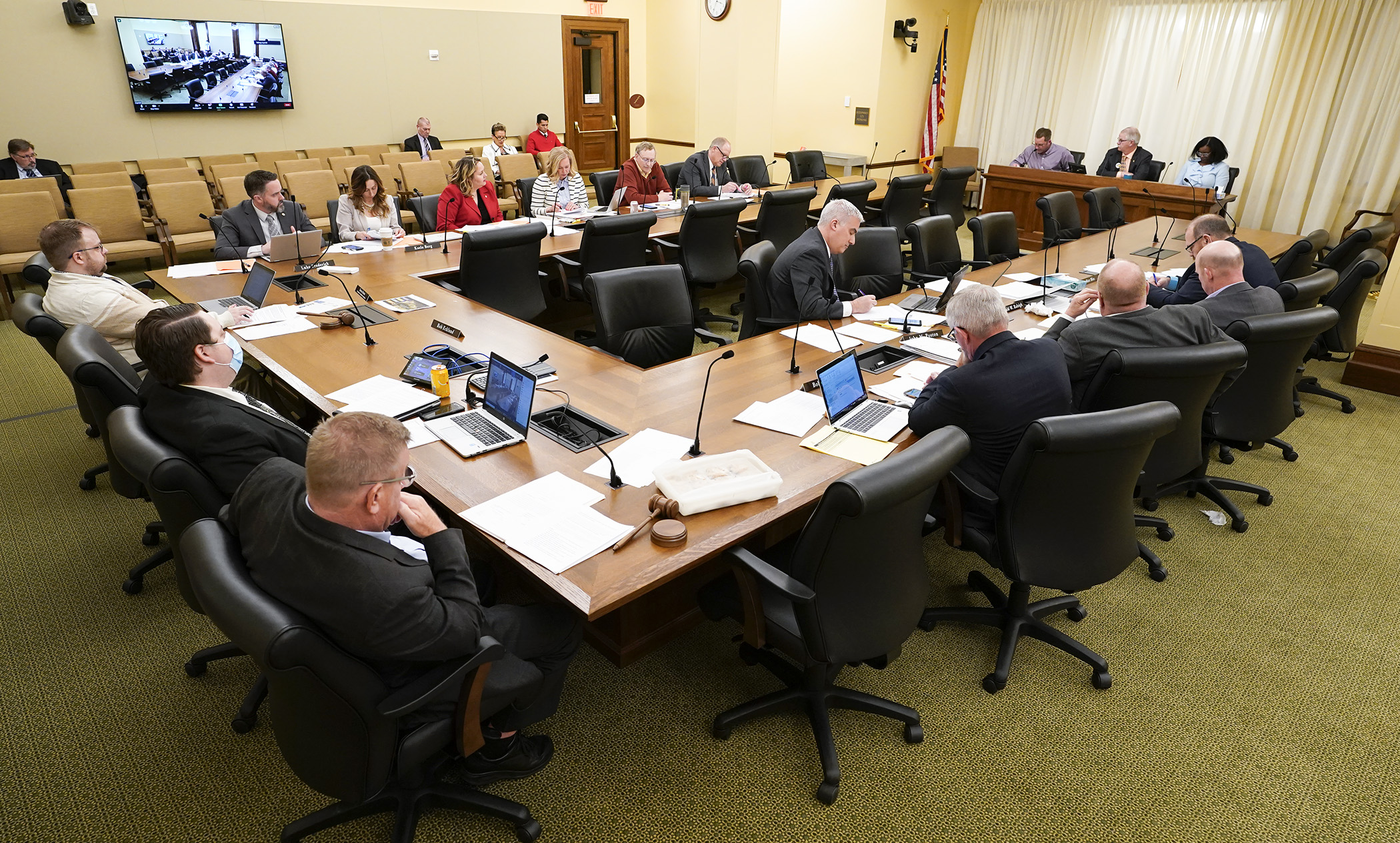Omnibus labor and industry bill approved on party-line vote

Increased worker protections, new funding for apprenticeships and job training, and a license fee holiday for construction trade workers are among the provisions championed by the DFL in the omnibus labor and industry bill.
It would also ban some non-compete clauses, increase Occupational Safety and Health Administration penalties and modify fair labor standards for agricultural and food processing workers, which are points of concern for Republicans.
As modified by a delete-all amendment that was itself amended, HF4177, sponsored by Rep. Rob Ecklund (DFL-International Falls), is the omnibus labor and industry finance and policy bill.
It was approved on an 8-5 party-line vote Tuesday by the House Labor, Industry, Veterans and Military Affairs Finance and Policy Committee and referred to the House Ways and Means Committee.
“We’ve had some interesting conversations, sometimes raucous debates, on several of these proposals,” said Ecklund, the committee chair. “Is there everything in this bill that the chair wanted? Not at all, but I believe that we’re putting forward a good bill that looks out for the working men and women in this state. I’ve made it clear throughout the session that this committee is going to make sure that our working men and women, our veterans and our National Guard members are the focus and scope of this committee.”
The bill includes $8.58 million to the Department of Labor and Industry in fiscal year 2023 and $12.9 million in the next biennium. Of the 2023 total, $4.33 million would go toward labor standards and apprenticeship provisions. Also, $3.36 million would go to the Construction Code Fund to cover the fee holiday for building and construction licenses for electricians, plumbers, pipefitters, and other building trades workers.
The Bureau of Mediation Services would receive a $400,000 appropriation in fiscal year 2023 and the agency’s base in 2024 and 2025 would be $525,000.
The Worker’s Compensation Court of Appeals would receive $300,000 in fiscal year 2023 with $200,000 added to the agency’s base in 2024 and 2025.
[MORE: View the spreadsheet]
Among the policy changes, the bill would prohibit non-compete agreements unless certain exceptions apply. Also, a variety of changes would be included to the combative sports licensing system, including incorporating the Unified Rules of Boxing.
The bill would make several changes to OSHA penalties to increase fine amounts to conform to federal law. Yearly increases to fine amounts would be tied to inflation.
“If Minnesota doesn’t comply with our OSHA regulations, then it will go back to a national program and we won’t have that flexibility when there’s a problem in an industry,” Ecklund said. “They will automatically be fined to the maximum amount. Right now, if there’s a problem with the industry, the commissioner and staff can work with that industry.”
A news release from Ecklund’s office notes that Minnesota has some of the lowest OSHA penalties in the country.
The bill would include updates to fair labor standards for agricultural and food processing workers, including an update to the Packinghouse Workers Bill of Rights. Employers would need to provide notice to agriculture workers about their workers’ compensation rights, the notice would be required to be provided in the worker’s preferred language and penalties would be increased for noncompliance.
The updated standards are part of Republicans’ disagreement with the bill.
“We believe those provisions will do great harm to our business and job creators,” said Rep. Joe McDonald (R-Delano), speaking also about the non-compete clauses and OSHA penalties in the bill. “... We hope that the Senate, certainly will in conference committee, come together and take out some of the provisions that will do harm to our job creators.”
Rep. Donald Raleigh (R-Circle Pines) added: “We know that workplace safety is important to all employers and to all employees, workers at every single level. And with the pandemic and the extremely damaging shutdowns of the Walz-Biden administration, we’ve seen the impact that’s had on our job creators. So, the penalties that are in this bill seem to be onerous and contentious, and I’m feeling they’re creating an unnecessary tension between the workers and the job creators.”
Other notable funding provisions include:
- $1.76 million for prevailing wage enforcement ensuring employees on taxpayer-funded projects earn sustainable wages;
- $1.38 million for a labor education advancement program to focus on recruiting and retention of people of color, indigenous people and women in registered apprenticeship programs;
- $1 million in new funding for a logger safety grant program;
- $747,000 for youth skills training; and
- $200,000 for a veterans’ liaison coordinator at the Department of Labor and Industry.
The Senate omnibus bill is SF3881, sponsored by Sen. Jason Rarick (R-Pine City). It awaits action by the Senate Finance Committee.
***
What's in the bill?
The following are select bills incorporated in part or in whole into the omnibus labor and industry bill:
Related Articles
Search Session Daily
Advanced Search OptionsPriority Dailies
Speaker Emerita Melissa Hortman, husband killed in attack
By HPIS Staff House Speaker Emerita Melissa Hortman (DFL-Brooklyn Park) and her husband, Mark, were fatally shot in their home early Saturday morning.
Gov. Tim Walz announced the news dur...
House Speaker Emerita Melissa Hortman (DFL-Brooklyn Park) and her husband, Mark, were fatally shot in their home early Saturday morning.
Gov. Tim Walz announced the news dur...
Lawmakers deliver budget bills to governor's desk in one-day special session
By Mike Cook About that talk of needing all 21 hours left in a legislative day to complete a special session?
House members were more than up to the challenge Monday. Beginning at 10 a.m...
About that talk of needing all 21 hours left in a legislative day to complete a special session?
House members were more than up to the challenge Monday. Beginning at 10 a.m...